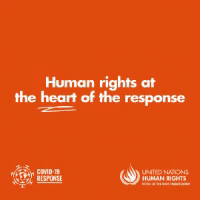A/75/148: Report: COVID-19 and the right to housing: impacts and way forward
Published
27 July 2020
UN symbol
A/75/148
Focus
Adequate housing
 The report underscores that housing has emerged as a key defense against COVID-19. At the peak of the Covid-19 emergency response, more than 3.9 billion people, or half of the world's population, were asked or ordered to stay at home by their governments.
The report underscores that housing has emerged as a key defense against COVID-19. At the peak of the Covid-19 emergency response, more than 3.9 billion people, or half of the world's population, were asked or ordered to stay at home by their governments.
However, 1.8 billion people do not have a decent home and live in informal settlements where physical distancing is difficult or impossible. Many millions, especially renters and small landlords, are at risk of losing their home due to the economic impact of the pandemic.
Too many people live in overcrowded homes in which it is hardly possible to self-isolate. Millions lack adequate access to water and sanitation to follow hygiene recommendations. And many have no home at all and live in street situations or in encampments.
Key findings
- The impact of Covid-19 on the right to housing has been very unequally distributed, reflecting pre-existing hierarchies and inequalities along racial, gender and other lines. Mortality and infection rates are significantly higher among minorities and other vulnerable groups with inadequate housing conditions which have contributed to excessive, largely preventable death and suffering.
- Many temporary mitigation measures have either already come to an end or may soon do so. An unprecedented spike in evictions, hunger, homelessness and eventually mortality is therefore to be expected.
- Forced evictions have continued, if not accelerated, during the pandemic. Persons evicted are now facing worsening conditions with heightened risk of infection, community spread of the virus and mortality.
Recommendations
- The right to housing should be a key element of response and recovery measures to the pandemic. This requires that sufficient resources are allocated towards realising the right to adequate housing for all.
- States should halt all evictions proceedings, including against non-national residents, and to end the sweeping of encampments or tents of homeless people.
- National and local governments should house people experiencing homelessness in hotels or make vacant housing and buildings accessible to them. Homeless people should not be put back on the street.
- Recovery measures should not be discriminatory and should leave no one behind. Special measures must be put in place to guarantee that groups who have been subjected to systemic discrimination and marginalization benefit from the response and recovery measures. In order to address effectively marginalization and discrimination in relation to housing, data disaggregated by race, gender, caste, religion, disability, sexual orientation or gender identity must be collected and shared publicly.
- States should consider rent caps and subsidies for tenants and small landlords, and ensure that a global health crisis does not become a global housing crisis. As a general goal no one should have to pay more than 30 percent of her or his income towards housing.
- States should constrain the role of private equity firms as landlords and improve rights and protections of tenants.
- Low income countries should receive adequate development financing so that they can continue to address grossly inadequate housing conditions.
Read the full report in Arabic, Chinese, English, French, Spanish or Russian
Further Resources
- COVID-19 Guidelines on banning evictions and to protect people living in informal settlements, homelessness, renters and mortgage payers
- Statements and Op-Eds by the Special Rapporteur on COVID-19
Methodology
To inform his report the Special Rapporteur invited States, local Governments, National Human Rights Institutions, UN agencies and civil society organizations to respond to a questionnaire and submit relevant information. In addition virtual consultations were held with States, local Governments and civil society organisations on 10, 16 and 24 June 2020.

Issued By:
Special Rapporteur on adequate housing as a component of the right to an adequate standard of living, and on the right to non-discrimination in this context
Delivered To:
75th session of the General Assembly in 2020